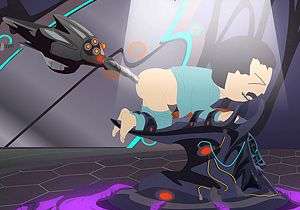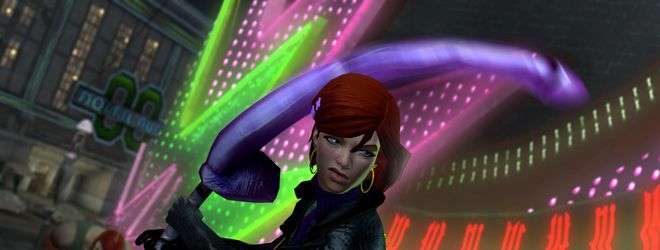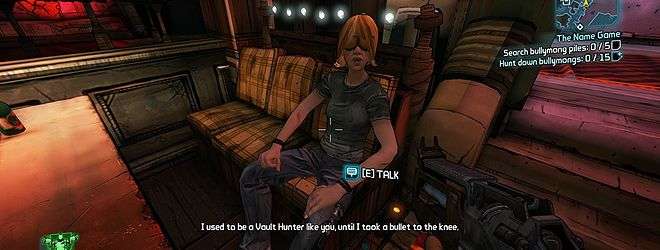Best of 2014 – Comedy in Videogames
by Adam Smith
First Published: May 28, 2014
Voted For By: Lorna
Reason(s) For Vote:
Adam presents a neat analysis of comedy in games that wipes away the clown paint and tears, and takes a look at what’s underneath and why, on the whole, comedy in games just isn’t working. His breakdown is succinct and well-thought out and had me nodding my head in agreement. – Lorna

You are paying for that snake to be dry-cleaned
They say that comedy equals tragedy plus time. And usually, that’s true. Take an awkward or tragic situation, put enough hours on the clock between it and the present and voila, humour occurs. Television and film have an absolute gold mine of comedic timing to play with, allowing anything up to an hour and a half for a joke to pay off (such as Paranorman).
It’s why British comedies such as Peep Show and The Office are so successful. Time is the great distance, an ever-widening plain, which is why it is very difficult to create a comedic video game.
This does not mean that video games are not funny – they clearly are. Games such as Portal, the Saints Row series, or Deadpool are humorous games, and there is usually a smattering of comedy laced in every game for good measure. But a game based solely around making its players laugh is a challenging feat for a number of reasons:
Distance
Most of the time, when something is funny, it is because it is not happening to you. Very rarely can someone immediately appreciate humour when it is he or she themselves that is the butt of the joke but, as we all know, (because I assume every reader of this article is human with some semblance of what a funny human interaction is) telling that story again merits raucous laughter. Distance between the joke and the occasion makes it funny. In a video game, however, everything is immediate; there is no past because we’re never really accessing memory or comparing the game to real-world scenarios. There’s no time for a set-up, nor for the player to get comfortable with one way of thinking just for another to appear by surprise; they are constantly awaiting a change in the world, something new to react to. It’s difficult for them to laugh at a situation because they’re always thinking about what is coming next. Which leads me to the next problem…
 Input
Input
Quite simply, there is too much input for a player in a video game. So much so that it almost floods the senses, which is what it’s intended to do. What video games have over films or books is the unity of sound, visuals, and movement, but if a player is focused too much on one of these elements, then any joke the developer has in mind falls apart. Compare this scenario with a comedy club – the comedian has crafted the pauses, and the rise and fall of their voice; this can’t be done with a video game without aeons of focus testing.
Freedom makes the video game powerful, yet it also ruins humour. While most comedy comes from an almost-certain inevitability that the tragic thing had to happen, in a video game most tragedies can be avoided, otherwise the player can’t successfully complete the game.
Audience Taste
This is possibly the best and worst quality of the video game: its difficulty, and its variety. You can’t be bad at watching a film; you can’t be bad at reading a book; but you can be bad at playing a video game, and that can break up the setup to a joke so easily. Hours spent crafting a certain punchline at the end of a level, only for the player to have made so many attempts to try and reach it that once they do, they are either fraught, or ecstatic. If the former, they may not be in the frame of mind to appreciate the joke – if it’s the latter then the joke is unlikely push them emotionally higher, or worse, it may belittle their success. Secondly, comedy isn’t universal, especially when playing a video game.
 Taking a recent example from South Park: The Stick of Truth, where Eric Cartman plays on the turn-based strategy that defines an RPG by telling another character (and the player) that this is just how the games work; a nice bit of metahumour that all players of RPGs will likely understand. But not all people know about RPGs, as some are bound to be new players. Just as Frankie Boyle doesn’t host children’s parties, the game needs to cater to everyone, and because comedy cannot do this, it’s easier for the developers to leave it out. If one goes to a comedy show, they know what to expect from the humour. Yet the taste of the gamer is so vast that the developer can’t be sure that they will be able to empathise.
Taking a recent example from South Park: The Stick of Truth, where Eric Cartman plays on the turn-based strategy that defines an RPG by telling another character (and the player) that this is just how the games work; a nice bit of metahumour that all players of RPGs will likely understand. But not all people know about RPGs, as some are bound to be new players. Just as Frankie Boyle doesn’t host children’s parties, the game needs to cater to everyone, and because comedy cannot do this, it’s easier for the developers to leave it out. If one goes to a comedy show, they know what to expect from the humour. Yet the taste of the gamer is so vast that the developer can’t be sure that they will be able to empathise.
Laughter may be the best medicine, but right now the games industry has an illness we cannot find the cure to.
Last five articles by Adam Smith
- Best of 2014 - Comedy in Videogames
- Fates Forever - Review
- Lifeless Planet - Review
- Transistor - Review
- Comedy in Video Games





















There are no comments, yet.
Why don’t you be the first? Come on, you know you want to!